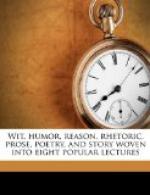“He was never much on stirrin’
round,
Sich wasn’t his desire;
When weather cool, he was always found,
A sittin’ round the
fire.
“When the frost was comin’
down,
And the wind a creepin’
higher,
He spent his time just that way,
A sittin’ round the
fire.
“Same old habit every day,
He never seemed to tire;
While others worked and got their pay,
He sat there by the fire.
“When he died, by slow degrees,
Some said, ‘he’s
gone up higher;’
But if he’s doin’ what he
did,
He’s sittin’ round
the fire.”
The man or woman who lives in this age of the world and lives in idleness, should have lived in some other age. When ox-teams crept across the plains, and stage coaches went six miles an hour, idleness may have been in some kind of harmony with the age, but now, when horses pace a mile in two minutes, express trains make fifty miles an hour, and aeroplanes fly a mile in a minute; when telephone and telegraph send news faster than light flies, the idler is out of place. Carlisle said: “The race of life has become intense; the runners are tramping on each other’s heels; woe to the man who stops to tie his shoestrings!”
Young man, if you would keep step with the energy of the age in which you are living, and be ever found on the safe side of life, you must not only be equipped with education, stability and ambition, but to make sure you should start right. If you are going to California tomorrow, which way would you start, east or west? You say: “We would start west.” A man riding along a highway said to a farmer by the wayside: “How far to Baltimore?”
The farmer answered: “About twenty-five thousand miles the way you’re going; if you’ll face about and go the other way, it’s fourteen miles.”
Young man, which way are you going?
Does someone in my presence say: “I have started wrong; I take a glass of beer now and then; occasionally utter an oath, and am sowing wild oats in a few other fields; but I’ll come out right in the end.” Two diverging roads keep on widening; they don’t come together at the other ends. If you would make sure of the safe side of life in the end of the journey, then start right. Luke Howard graduated from a fine college and went to a large city to practice his profession. He boarded in a fine hotel and frequented fine saloons. He became dissipated and one morning after a drunken debauch the landlord said: “Sir, you disturbed my boarders last night and I must ask you to leave.” Young men, did Luke Howard go to a better hotel? No, but to a grade lower; he started wrong. In this hotel a few months later, he was asked to move on. Did he go to a better? No, still lower, until at last he went to board in the low tavern on the river front. The landlord said: “I remember when you graduated from college. I was present, saw the flowers and heard the applause that




